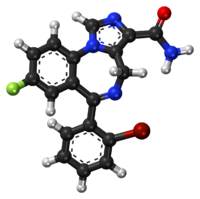 | |
 | |
| Clinical data | |
|---|---|
| ATC code |
|
| Identifiers | |
| |
| CAS Number | |
| PubChem CID | |
| ChemSpider | |
| UNII | |
| CompTox Dashboard (EPA) | |
| Chemical and physical data | |
| Formula | C18H12BrFN4O |
| Molar mass | 399.223 g·mol−1 |
| 3D model (JSmol) | |
| |
| |
| (verify) | |
Imidazenil[1] is an experimental anxiolytic drug which is derived from the benzodiazepine family, and is most closely related to other imidazobenzodiazepines such as midazolam, flumazenil, and bretazenil.
Imidazenil is a highly potent benzodiazepine receptor partial agonist[2] with an unusual profile of effects, producing some of the effects associated with normal benzodiazepines such as anticonvulsant and anxiolytic effects, yet without any notable sedative or amnestic[3] effects. In fact, imidazenil blocks the sedative effects of diazepam, yet without lowering the convulsion threshold,[4] and so potentially could be a more flexible antidote than the antagonist flumazenil which is commonly used to treat benzodiazepine overdose at present.
Imidazenil has not yet been developed commercially for use in humans, however it has been suggested as a safe and effective treatment for anxiety,[5] a potent yet non-sedating anticonvulsant which might be particularly useful in the treatment of poisoning with organophosphate nerve agents,[6][7] and as a novel treatment for schizophrenia.[8]
In rats, imidazenil has been demonstrated to have low tolerance or dependence liability, unlike other benzodiazepine receptor agonist ligands, such as diazepam, bretazenil.[9]
- ^ US 5317018
- ^ Thompson DM, Auta J, Guidotti A, Costa E (June 1995). "Imidazenil, a new anxiolytic and anticonvulsant drug, attenuates a benzodiazepine-induced cognition deficit in monkeys". The Journal of Pharmacology and Experimental Therapeutics. 273 (3): 1307–12. PMID 7791102.
- ^ Auta J, Faust WB, Lambert P, Guidotti A, Costa E, Moerschbaecher JM (June 1995). "Comparison of the effects of full and partial allosteric modulators of GABA(A) receptors on complex behavioral processes in monkeys". Behavioural Pharmacology. 6 (4): 323–332. doi:10.1097/00008877-199506000-00003. PMID 11224341. S2CID 24584434.
- ^ Auta J, Costa E, Davis JM, Guidotti A (September 2005). "Imidazenil: an antagonist of the sedative but not the anticonvulsant action of diazepam". Neuropharmacology. 49 (3): 425–9. doi:10.1016/j.neuropharm.2005.04.005. PMID 15964602. S2CID 44619421.
- ^ Atack JR (August 2003). "Anxioselective compounds acting at the GABA(A) receptor benzodiazepine binding site". Current Drug Targets. CNS and Neurological Disorders. 2 (4): 213–32. doi:10.2174/1568007033482841. PMID 12871032.
- ^ Rump S, Gidynska T, Galecka E, Antkowiak O, Nawrocka M, Kowalczyk M (2000). "Effects of imidazenil, a new benzodiazepine receptor partial agonist, in the treatment of convulsions in organophosphate intoxications". Neurotoxicity Research. 2 (1): 17–22. doi:10.1007/bf03033323. PMID 15545002. S2CID 2066413.
- ^ Auta J, Costa E, Davis J, Guidotti A (March 2004). "Imidazenil: a potent and safe protective agent against diisopropyl fluorophosphate toxicity". Neuropharmacology. 46 (3): 397–403. doi:10.1016/j.neuropharm.2003.09.010. PMID 14975695. S2CID 41221807.
- ^ Guidotti A, Auta J, Davis JM, Dong E, Grayson DR, Veldic M, et al. (July 2005). "GABAergic dysfunction in schizophrenia: new treatment strategies on the horizon". Psychopharmacology. 180 (2): 191–205. doi:10.1007/s00213-005-2212-8. PMID 15864560. S2CID 25147595.
- ^ Auta J, Giusti P, Guidotti A, Costa E (September 1994). "Imidazenil, a partial positive allosteric modulator of GABAA receptors, exhibits low tolerance and dependence liabilities in the rat". J Pharmacol Exp Ther. 270 (3): 1262–9. PMID 7932179.
{{cite journal}}: CS1 maint: multiple names: authors list (link)